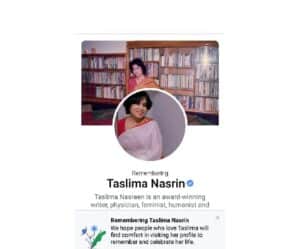Author Taslima Nasreen says she is very much alive after Facebook declares her dead

Bangladeshi-origin author and Human Rights activist Taslima Nasreen on Tuesday took to Twitter to declare that she is very much alive. Nasreen’s Facebook account, however, said otherwise. Facebook memorialised Taslima Nasreen’s facebook account, saying: “We hope people who love Taslima will find comfort in visiting her profile to remember and celebrate her life.”

😮 @Meta @fbsecurity @facebookapp @MetaNewsroom @Facebook I am very much alive. But you memorialized my facebook account. What a sad news! How could you do that? Please give me back my account. pic.twitter.com/mwZNbcOopy
— taslima nasreen (@taslimanasreen) January 18, 2022
Tweeples reacted to Nasreen’s Twitter post, with speculations about threat to her life. “Could this be a threat to her life ?,” wrote a Twitter user. “Facebook fail,” said another.
Could this be a threat to her life ? https://t.co/kXEnsIReiW
— Uttam Pegu/乌塔姆·佩古/Umme Pe’gu/उत्तम पेगू/উত্তম পেগু (@uttampegu) January 18, 2022
Facebook FAIL https://t.co/2IRixRRqwS
— 𝗗𝗜𝗩𝗬𝗔𝗠⚡️JAIN (@divyamd) January 18, 2022
About a Facebook memorialised account
Facebook memorialises an account by default when it is notified of the actual death of the person whose Facebook account is to be memorialised.
At a memorialised Facebook account, friends and family members can share messages and memories on the timeline of the deceased person. Such accounts do not appear in public searches and they have the word “Remembering” shown next to the person’s name in their profile.
As per Facebook’s guidelines, no one can log into memorialised accounts.
But if one has appointed a “legacy contact”, they can manage the account after it has been memorialised. This includes writing pinned posts, responding to friend requests, update profile pictures and cover photos or request for the removal of your account. The legacy contact, however, cannot log into one’s account, change the past posts or read the messages.
“If someone chooses, they may give their legacy contact permission to download an archive of the photos, posts and profile information they shared on Facebook,” Facebook had said in an official statement in 2015.





